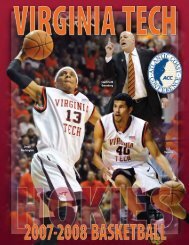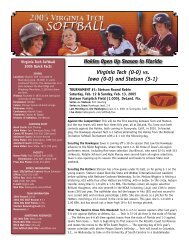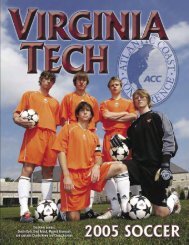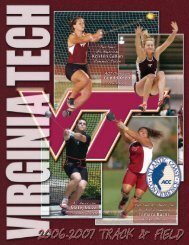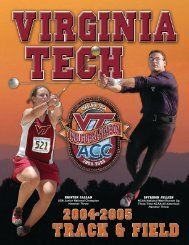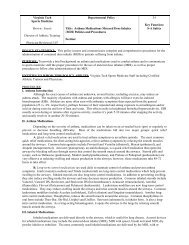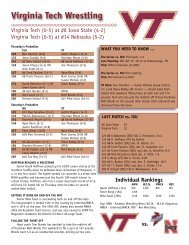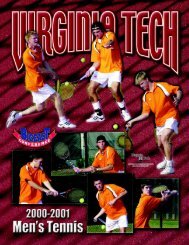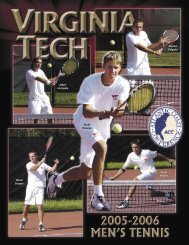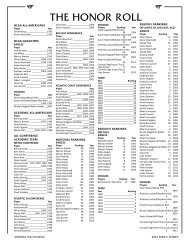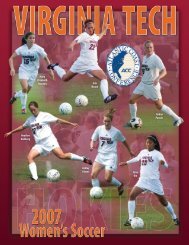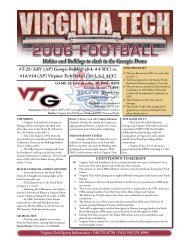2008 ORANGE BOWL GUIDE - HokieSports
2008 ORANGE BOWL GUIDE - HokieSports
2008 ORANGE BOWL GUIDE - HokieSports
You also want an ePaper? Increase the reach of your titles
YUMPU automatically turns print PDFs into web optimized ePapers that Google loves.
<strong>2008</strong> <strong>ORANGE</strong> <strong>BOWL</strong> <strong>GUIDE</strong><br />
uNIVERSITY pRESIDENT<br />
Dr. Charles Steger<br />
Now in his eighth year as<br />
President of Virginia Tech, Dr.<br />
Charles Steger has charted a<br />
course to bolster the university’s<br />
research enterprise and to<br />
compete among the nation’s<br />
premier research institutions.<br />
Under his direction, the university<br />
has adopted a strategic plan<br />
that is guiding the growth<br />
of the research enterprise,<br />
fostering outreach initiatives,<br />
and increasing quality across<br />
all aspects of the academic<br />
community.<br />
In the minds of many, Steger<br />
will best be remembered for<br />
making the impossible a reality.<br />
He will be forever credited with<br />
University President<br />
negotiating Virginia Tech’s<br />
entrance into the Atlantic Coast<br />
Conference — a 50-year dreamcome-true<br />
for Hokie fans.<br />
On a more tragic note,<br />
President Steger will also be<br />
remembered for his inspirational<br />
leadership during the dark days<br />
after April 16. The university<br />
continues its healing taking its<br />
cue from Steger, “moving on, but<br />
not forgetting,” those who lost<br />
their lives to madness.<br />
Another of the most<br />
memorable contributions of<br />
Steger’s administration was his<br />
role in the Higher Education<br />
Restructuring Act, which took<br />
effect in July, 2006. Steger<br />
Virginia Tech Principles of Community<br />
was one of the leaders among<br />
university presidents who<br />
helped define a ground-breaking<br />
new relationship between the<br />
Commonwealth of Virginia and<br />
its colleges and universities,<br />
that enables greater institutional<br />
flexibility and potential for<br />
growth. This legislation allows<br />
Virginia Tech to perform longrange<br />
planning, ensure a stable<br />
and predictable revenue stream,<br />
and ultimately ensure a quality<br />
education for its students.<br />
A hallmark of Steger’s<br />
administration is his commitment<br />
to students. Under Steger’s<br />
leadership, the university has<br />
reaffirmed its core mission<br />
Virginia Tech is a public land-grant university, committed to teaching and learning, research, and outreach to the<br />
Commonwealth of Virginia, the nation, and the world community. Learning from the experiences that shape Virginia<br />
Tech as an institution, we acknowledge those aspects of our legacy that reflected bias and exclusion. Therefore, we<br />
adopt and practice the following principles as fundamental to our on-going efforts to increase access and inclusion<br />
and to create a community that nurtures learning and growth for all of its members:<br />
We affirm the inherent dignity and value of every person and strive to maintain a climate for work and learning<br />
based on mutual respect and understanding.<br />
We affirm the right of each person to express thoughts and opinions freely. We encourage open expression within a<br />
climate of civility, sensitivity, and mutual respect.<br />
We affirm the value of human diversity because it enriches our lives and the university. We acknowledge and respect<br />
our differences while affirming our common humanity.<br />
We reject all forms of prejudice and discrimination, including those based on age, color, disability, gender, national<br />
origin, political affiliation, race, religion, sexual orientation, and veteran status. We take individual and collective<br />
responsibility for helping to eliminate bias and discrimination and for increasing our own understanding of these<br />
issues through education, training, and interaction with others.<br />
We pledge our collective commitment to these principles in the spirit of the Virginia Tech motto of Ut Prosim (That I<br />
May Serve).<br />
54 VIRGINIA TECH FOOTBALL 2007<br />
of undergraduate education.<br />
The university is dedicated to<br />
fostering a research intensive<br />
environment that offers<br />
students an opportunity to learn<br />
the scientific process while<br />
enhancing their critical-thinking<br />
skills.<br />
Recognizing that students,<br />
upon graduation, will be entering<br />
a global economy, Virginia<br />
Tech initiated a comprehensive<br />
International Strategic Plan<br />
and has doubled the number<br />
of students participating<br />
in international education<br />
opportunities.<br />
Steger’s ties to Virginia Tech<br />
span five decades as a student,<br />
professor, dean, vice president<br />
and now president. While on the<br />
faculty, he twice won teaching<br />
excellence awards. When he<br />
became dean of the College of<br />
Architecture and Urban Studies<br />
in 1981, he was, at age 33,<br />
the youngest architecture dean<br />
in the nation. His most recent<br />
publications include book<br />
chapters on the topics of the<br />
business of education and the<br />
university presidency.<br />
Steger is past chair of the<br />
Virginia Council of Presidents<br />
and currently chairs the Virginia<br />
Space Grant Consortium. He is a<br />
member of the National Council<br />
on Competitiveness and the<br />
Association of Governing Boards<br />
of Universities and Colleges. The<br />
New Century Technology Council<br />
awarded him its 2004 Compass<br />
Award for visionary thinking<br />
and leadership in the field of<br />
information technology.<br />
Steger is a Fellow in the<br />
American Institute of Architects,<br />
and holds the William C. Noland<br />
Award for distinguished service<br />
and accomplishments from the<br />
Virginia Society of the AIA.<br />
Steger received his bachelor<br />
of architecture, master of<br />
architecture and Ph.D., in<br />
environmental science and<br />
engineering from Virginia Tech.




